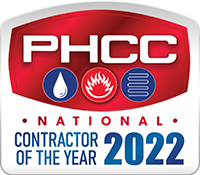
With winter just around the corner in Maryland, it’s a good time to think about the condition of your home’s plumbing. Water supply pipes are prone to freezing and bursting during extended cold periods, and this is especially true for older types of pipes like polybutylene.
Commonly installed from the 1970s to the late 1990s, this early type of plastic pipe has proven to have an extremely short service life, lasting as little as 10 to 15 years in some cases. If your Maryland home has polybutylene pipes, consider whole-home repiping from United Air Temp to avoid the costly damage that can occur if the pipe fails.
Why Are Polybutylene Pipes Bad?
Up until the late 1990s, polybutylene pipes were quite popular for use as hot and cold water supply lines in homes throughout the South, the Pacific Northwest, and the Mid-Atlantic region, including Maryland. Made from a type of plastic, polybutylene pipes are quite flexible, allowing for quick and easy installation, and they were less prone to damage during freezing temperatures than metal pipes, because they can expand slightly as the water inside freezes. They were seen as a durable, cost-effective alternative to copper or galvanized steel pipes when they were first introduced.
Over time, however, it became apparent that polybutylene pipes were susceptible to damage from chlorine, chloramines, and fluoride, which are added to municipal water supplies to sterilize the water and prevent tooth decay. In as little as 10 years, polybutylene pipes can become brittle and start to crack or leak when exposed to these substances.
Furthermore, the resulting reactions can leave potentially dangerous chemicals in the water supply. If your home has polybutylene pipes, there may be a risk of water damage and structural problems if the pipes fail, as well as health issues if your water is contaminated by damaged pipes.
How Do I Know if I Have Polybutylene Pipes?
Polybutylene pipes are flexible plastic pipes that are typically blue, gray, or black. They look similar to modern PEX piping, except for the color, and they may have “PB or “QEST” printed along their length. The pipe will be crimped onto fittings using metal bands, similar to PEX, and those bands are usually copper or silver in color.
Although most of your water supply pipes will be hidden in the walls of your kitchen or bathroom, some may be visible in a basement or crawl space, or where it is stubbed out of the wall to connect to a fixture like a sink or an appliance like a water heater.
Why Can’t I Repair Polybutylene Pipes?
While it may be possible to stop a leak in a polybutylene pipe, once the pipe starts leaking, it is likely that more leaks will follow. With such a short service life, replacing polybutylene pipe is usually a better investment than repairing it. Repiping your home will help to prevent future leaks and the extensive damage that they can cause.
What’s Involved in Repiping a House?
Whole-home repiping is the process of replacing all your hot and cold water supply pipes with new, modern piping. It’s a large job that will usually take a few days to a week or more, depending on the size of your home and its layout. The repiping process typically includes:
- Evaluating the plumbing system: Your plumber will verify that polybutylene piping is present and determine which fixtures it feeds.
- Obtaining permits: Before work begins, your plumber will need to obtain the permits from the county.
- Gaining access: Drywall may need to be removed from small areas of the walls and ceilings to gain access to the polybutylene pipe.
- Removing the polybutylene pipes: Where possible, the polybutylene pipe will be removed. In areas like slab foundations, the existing polybutylene may be abandoned, with new lines installed instead.
- Installing new piping: Modern piping will be installed to replace the polybutylene pipe.
What Material Replaces Polybutylene Piping?
Polybutylene piping can be replaced with any of the following types of pipe:
- Copper piping: Copper pipe is extremely durable, with a life span of 50 to 70 years or longer, but it can also be costly, and it is prone to damage if exposed to freezing temperatures.
- PEX piping: PEX offers plenty of flexibility for easy installation, it is more resilient in freezing temperatures than copper or PVC, and it can last 30 to 50 years.
- CPVC piping: Easy to install and cost-effective, CPVC pipe features a long life span of up to 100 years, but it can be more vulnerable to freezing.
Request Whole-Home Repiping in the Baltimore Area
If you suspect that you have polybutylene piping in your Baltimore home, talk to our team at United Air Temp. We offer whole-home repiping in Baltimore, Towson, Frederick, Annapolis, and the surrounding areas.
Our expert plumbers can recommend the best replacement pipes for your home and your budget, and we offer flexible financing options to make the process as convenient as possible.
Our company has been a leader in home comfort for over 90 years, and we feature friendly, experienced personnel, upfront pricing, impressive customer reviews, and a 100% satisfaction guarantee on all our services.
From plumbing and electrical services to heating, air conditioning, and more, we’re here to help with all your most crucial home comfort needs.
Call United Air Temp today at (410) 413-3549 to request whole-home repiping services anywhere in the Baltimore area.

















